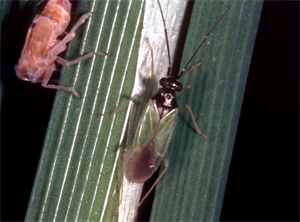- Restricted. Asia, Africa (Mauritius), North America (Hawaii), Oceania. In Australia, Fiji, Guam, Northern Mariana Islands, Papua New Guinea, Samoa, Solomon Islands, Vanuatu.
- A mirid bug that preys on eggs and young nymphs of leaf and plant hoppers on rice and wild grasses. Eats up to 20 eggs and five nymphs a day.
- Adults are light green, green winged, with black head and thorax, and long antennae. Eggs are laid inside plant stems. Short flights in early mornings and evenings; longer flights of hundreds of kms in India following the white-backed planthopper (see Fact Sheet no. 423).
- Control: The recommendation of IRRI is that if natural enemies out-number leaf or plant hoppers, insecticides should not be used as the risk of 'hopperburn' is low. This applies even to crops already damaged by brown plant hoppers.
Pacific Pests, Pathogens and Weeds - Online edition
Pacific Pests, Pathogens, Weeds & Pesticides
Rice bug (419)
Rice bug
Cyrtorhinus lividipennis
AUTHOR Grahame Jackson
Information (and Photos 1&2) from Plant Bug. In: Beneficials. Rice Knowledge Bank. IRRI. (http://www.knowledgebank.irri.org/images/docs/beneficial-organisms-that-attack-insect-pests.pdf); and Planthopper. Rice Knowledge Bank. (http://www.knowledgebank.irri.org/training/fact-sheets/pest-management/insects/item/planthopper); and from 1CABI (2018) Cyrtorhinus lividipennis. Crop Protection Compendium. (https://www.cabi.org/cpc/datasheet/17539).
Produced with support from the Australian Centre for International Agricultural Research under project HORT/2016/185: Responding to emerging pest and disease threats to horticulture in the Pacific islands, implemented by the University of Queensland and the Secretariat of the Pacific Community.





